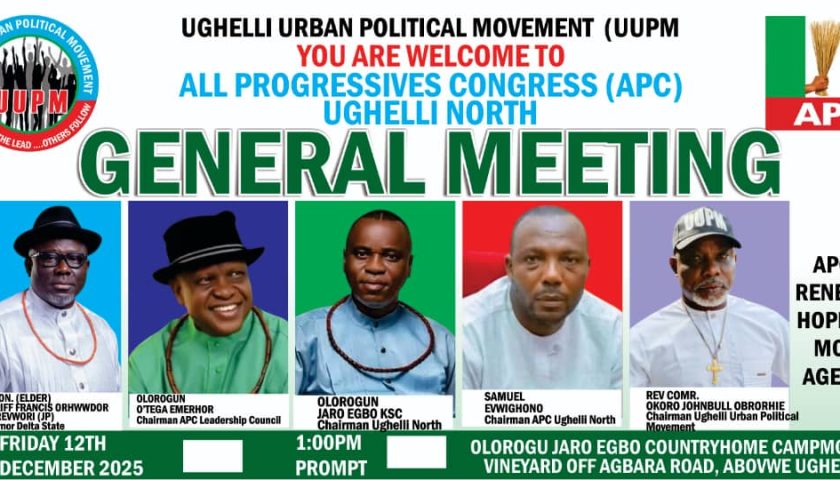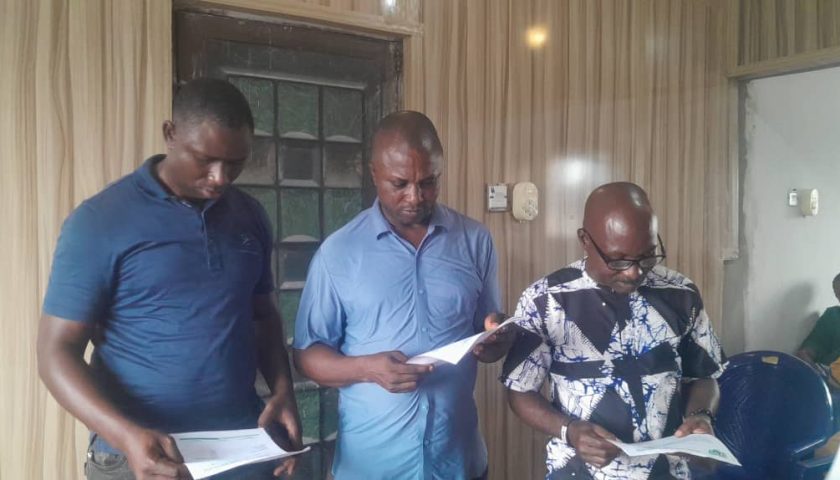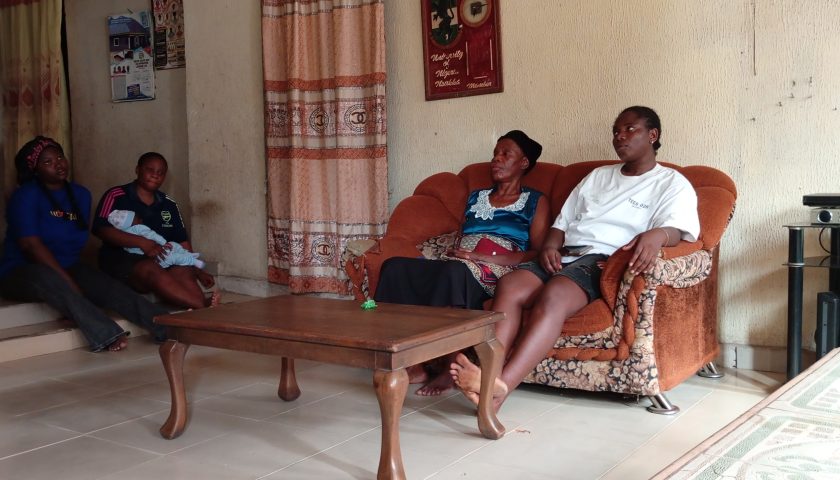Bashorun Askia Ogieh is the Managing Director/Chief Executive Officer of Delta State Oil Producing Areas Development Commission (DESOPADEC). In this interview, he talks about the innovations his board introduced in the last one year to meet the development challenges of the mandate areas and the many successes achieved so far.
When Delta State Governor appointed you as the Managing Director/Chief Executive Officer of DESOPADEC Board, he gave a very rich citation. How would you say these credentials have actually prepared you for the position?
Ordinarily, the experiences in my many years in the private and public sectors have actually put me in a good stead for this job and I do know also that the job itself is not just about my own experience, because the management of the Commission is not a one-man affair. It is something that we have to do, and are doing, jointly, particularly with my colleagues and the executive management board and indeed the other members of the larger Board.
Like you said, I have been here before as the Executive Director, Finance and Administration and I was also in a very key position that exposed me to the running of DESOPADEC. And these all put together have actually positioned me in a very good stead.
So, my understanding of the workings of DESOPADEC as a grassroots person remains a huge leverage for me and the assignment thrust on me by His Excellency, the governor. I have come to use my wealth of experience to better the lives of my people, to reach them at their point of needs and to effectively deliver on the mandate of the Commission.
On one occasion, you did say you were here with a new song. We would want to ask what exactly is this new song and how acceptable has this new song been thus far?
Well, when we came on board, it was very necessary for us to do a bit of rebranding, because, like I said, I have been here before. I know the few areas where errors were made at the Board level. And my own is to ensure that these things are corrected. And people were just taking advantage of the system.
We also needed to ensure that we did more and so, we started placing the HODs in positions that we felt were most appropriate to their training and background; where they could put in more in terms of their output by placing round pegs in round holes. And so, we did that rebranding along the line.
You were the Executive Director of Finance and Administration in the last board, and now you came in as Managing Director/CEO. Can we say this management style is somehow different from the former?
Yes, and it is to be expected. The former Board where I was EDFA, we did a wonderful work even though I was not at the driver’s seat the way I am now. But I was very prominent in it.
Also, I would say that all I am doing is my own way to improve what has been done and even previously. The foundation was laid then and to add more blocks to it in a more perfect manner; that is what we have done.
We will like to look at your to-do-list for the past twelve months. Now, we are saying congratulations for being on board for the past one year and we know that you have planned for the things you want to do. We would like to know if you have achieved all so far?
To a large extent, I can simply say that we have done very well. So far so good, as per my action plan for the Commission, I think I have been following it very effectively. Like I said, every programme that we have initiated within the period, knowing the needs of the people as harvested through the town hall meetings, has actually helped us.
This includes the projects that we are sure that funding is available. I have always told my people and I have to beg them that it will fully come to this, not when you have a budget of ten million and you award a contract of a hundred million.
I don’t know how many budget circles you are going to use to deliver on that project. It is like planning to abandon the project from conception. For me, that is not acceptable.
So, the projects may not be too many but we are ensuring that the ones we are planning for are those that we can deliver. Since we came on board, we have been able to deliver quite a number of projects, with a handful of others ongoing.
In all of these that you have taken time to enumerate here, which of them would you say is the most outstanding project?
As a grassroots politician, I will go for my women folks that we have been able to inspire to turn their passion into wealth. That one cuts across and I am all joy for that. But for the purpose of legacy, I pray that I am able to complete this DESOPADEC Tower because it will stand the test of time.
We are doing a lot of piling which is going on and if we finish it as scheduled, I can promise you in one year maybe next time when we are coming for the second anniversary, the building would be standing and completed.
I will say that whenever I leave this place, I will always look back to say it was a good work. But I must say that the quantum of these achievements that I have been rolling out is a product of team work. I am so blessed that I have a set of fine gentlemen that are in the executive management team with me.
We have been able to synergize properly, maybe after going to Lagos Business School, we had a clearer optic of ideas of what we were called to do and how to deliver same to our people. This Board consists of a rich admixture of jolly good fellows, most of them grassroots politicians who bond perfectly with our people.
They know that we have to change the narrative to make the lives of our people more purposeful. And understandably therefore, we are all on the same page.
We know it is not always easy, there must have been some challenges here and there, so we would like to know the major challenges your team has experienced and how you overcame them?
The major challenge we had was a bit of institutional because like I said, some see DESOPADEC as an institution which is just an empowerment scheme cum agency – that is allow the people to be there, just pay them even when they do nothing and don’t come to work and all of that.
It is trite in management that when you are changing from one level to another for the purpose of efficiency and productivity, there is the tendency for people naturally to resist that change.
So, as you said, that challenge was already there. And that informs why we decided to be very transparent in the way we do things and upscale the technology of efficiency so that the people can understand that they are not just being punished but it is just a policy that they need to adhere to in their own interests.
And we have issued circulars to them regarding the various degrees of sanctions that await absenteeism. Imagine for ex ample, if you are out of work for about two to three months, I don’t think you can safely say you are a staff of that place because we had people that were taking very undue advantage of the Commission’s seemingly lax system thereby engaging in dual or even more jobs.
They are elsewhere and they are receiving their pay here. We can’t continue like that! So, the implementation of these policies was meeting some resistance which has become a challenge.
Moreover, we have the challenge of funds. You know, when you plan, you need funding to actualise it. When you budget, you would want to achieve it and to achieve a budget; it will have to be marked with receipts from the state as we don’t have any form of internally generated revenue here.
Essentially, by the express provisions of the Nigerian Constitution, we are hooked on to the state to access 50 percent of the entire 13 percent of the derivation funds accruing to our state as a major oil-producing constituent of the federation.
And so, the state has to release funds to us for us to operate effectively. There is also the sudden, unexpected and devastating pandemic that happened. This has affected the entire world and brought the world to its knee and we are in the same world and the same country, obviously partaking of the brunt. So, it has affected us greatly.
What is your word of advice to the people of the oil-producing communities?
Before the advice, I must say that when I was treating the issue of what we have done, I can say that it is not everything that has been done by the way we planned. So, looking forward and God willing, if the finances are better; we have the mind to go into agriculture effectively.
We will be looking at environmental issues and more win-win initiatives. We are thinking that our people should be self-sustainable in terms of food. I don’t need to overstress that food security is a sine qua non to the maintenance and sustenance of peace and security. That is how it works.
We are going to be looking at opening farm lands for large scale farmers and then this is not just about cropping alone but both fishing and having a number of farmers to be provided with fingerlings, among others. If it is possible, we will be looking at reviving farm settlements or in a smaller scale, cluster farming.
And see how people can come together in one place doing one type of business, populating the place to get it done so that what you are giving to them can cut across them greatly, because we need to take most of our people off the streets yearly.
When you provide the amenities, their stomach has to be full and the place can be peaceful. That is one area that I am looking at effectively. Having said that, I must say that I have received the support, prayers and cooperation of our leaders and the general public, our traditional rulers in the oil-bearing communities, they have been very fantastic, they have been very supportive and they have been open to us at all times.
Each time I call anyone of them, they have always listened. We have received a lot of useful advice and support from a lot of them.
Our youths have been very understanding too. You know, we just left the era of massive restiveness and things are getting better. So, I must thank them because if the place had remained restive, I will not be able to perform; May I thank them greatly.
I cannot not possibly end this segment without lauding my boss, Senator Ifeanyi Arthur Okowa. The man is built with the heart of gold. He didn’t just appoint us; he equipped us with all we needed. He has been very supportive.
He knows that we lay the golden egg from here. So, he is in a hurry to reach out to the people because we are providing and filling up the critical infrastructural gaps in a manner that conforms with international best practices.
That is what we are actually doing and that is why we are an interventionist agency. If not, whatever we are doing here, the state will also be doing. But where there are gaps, we quickly come in and knowing that we are providing those gaps by filling them up, he has been very supportive. He is a wonderful boss to work with. I remain eternally grateful to him.
Above all, I give all glory and adoration to God Almighty. To Deltans, I thank them for the support and I pray and advice that our youth continue to remain calm.
Our people should remain calm as we continue to roll up our sleeves for more interventions, upliftment and productive engagements to their delight. DESOPADEC is our own; let us work with one mind and enjoy the benefits thereof.





